I think cat lovers at any age are familiar with the sound of cat fights. It’s those threatening yowls and screeching meows that can catapult us out of our chair or from a deep sleep to see what is the matter with our feline friends.

We know several things about cats off the top of our head. They are obligate carnivores, they purr, they spend most of their day sleeping, but it’s important to always remember that cats are territorial beings. They take great pride in protecting their turf, and this is something they will fight for at the drop of a hat if another cat happens to encroach on their claimed territory. But we know that cats who are kept exclusively indoors can also fight with other felines in their home.
Here we will break down for you 5 things you should know about cat fights…
1. Unlike Dogs, Cats Are Not Pack Animals
We are not ones to compare felines and canines, but it’s crucial to remember this fact for your cat’s well-being. In order to help reduce the likeliness that your exclusively indoor kitties will find themselves in a cat fight, offer them their own designated things. This would include necessary items such as designated and separate food and water bowls and their own cat bed. Sharing is caring, but not in the eyes of felines!
If for any reason you are introducing a new cat into your life to join your existing cat, remember cats do not like change and this strange feline is suddenly right up in their sacred zone. Do not be surprised if they stake their claim upon initial meeting. Practice patience and do not force or rush their interactions with one another. Good things come to those who wait and you must honor and respect both your existing cat as well as your new addition to the family.

Cats are finicky creatures. Your cat may take to one cat without a hitch but look to fight another at first glance. We do not have the ability to speak cat and this can be puzzling to us. Dogs seem to get along alright in the presence of other dogs that they do not know, but this is certainly not the case with cats. Remember, cats meeting for the first time is a risky move. And there is no way for us to know the thoughts that will course through their feline mind so it’s best to assume the worst and hope for the best.
According to the Humane Society of the United States:
We do know that cats who are well-socialized (those who had pleasant experiences with other cats during kittenhood) will likely be more sociable than those who haven’t been around many other cats.
On the other hand, “street cats,” who are in the habit of fighting with other cats to defend their territory and food, might not do well in a multi-cat household.
2. Resist The Instant Reaction To Separate Them Yourself
Although you might want to step right in and push felines apart during a heated cat fight, this is dangerous and not all recommended. Instead, act fast and find a way to distract them and divert their energy off of each and on to you or something else. A toy, treats, or something else that they like, or find a way to make noise that will grab their attention.
If you go sticking your hands in between two cats that are locked into a cat fight, you might leave with some painful injuries. Unlike your cat, you don’t have fur protecting your body. And even your usually sweet and kind cat could strike you without realizing what or who they are lashing out at. Water is also a great distraction that works effectively. Spray the cats with a water bottle if you have one handy because this will serve to almost instantly grasp their attention and separate them. If you happen to have a pillow on hand, throw it at them to break up the fight as this soft object will not harm them.

3. There Are Differences Between Rough Play And Aggression
Some cats enjoy playing rough with other cats, but this does not mean that they are “fighting” in a literal sense. And there are some cats who are naturally more aggressive by nature. (Same with humans if you think about it!) A cat may need to act out their aggression by picking fights with their brothers and sisters or by causing a fight with a strange cat.
It is true that male cats are typically more aggressive than female cats, and even more so if the male cat is still intact. And more so, these naturally aggressive cats might have a tendency to gang up on female cats.
Spaying and neutering can greatly reduce aggression in cats. The behavior of one intact pet can negatively affect all of your pets. This, along with a laundry list of reasons, is why you should always have your cat neutered/spayed.

4. Cats Value Their Territory And Are Not Shy To Defend Their Kingdom
Your cat’s possessions, whether that’s their space or their toys, are very precious to them. If you allow your cat to travel outdoors and they get attacked when they wander outside of their designated territory, this could be very bad for both you and your cat. The best solution to keep your cat from being attacked by other cats, is to keep them exclusively indoors. And allowing your cat to travel outdoors once the sun is down, only increases their risk of being attacked by an aggressive and overly territorial cat. Better safe than sorry when it comes to your cat baby.
5. If Your Cat Keeps Fighting, There Is Likely An Underlying Reason Behind It
Sudden changes in your cat’s behavior are always cause for concern for any cat parent. Aggression is not something that will happen overnight and there are reasons why your sweet cat is suddenly acting out aggressively. If you find that your cat continues to fight it’s important that you seek the medical advice of your veterinarian. They will discuss with you your cat’s new and strange behavior and perform a thorough medical exam on them to assess for any possible medical conditions.

A cat that is experiencing pain will likely act out aggressively as a means to cope. This is not their fault and they should never be reprimanded for it. Your cat has a rhyme and reason for their actions. It’s up to you their dedicated owner to uncover what is plaguing your feline friend. The sooner you figure out why your cat is acting out of aggression and getting into cat fights, the sooner you can bring them back to their pleasant old self.
Want to know more about aggression in cats? Check out our article: Signs Of Aggression In Cats And How To Help
REMEMBER: ADOPT, DON’T SHOP, MICROCHIP YOUR PETS & SPAY AND NEUTER!


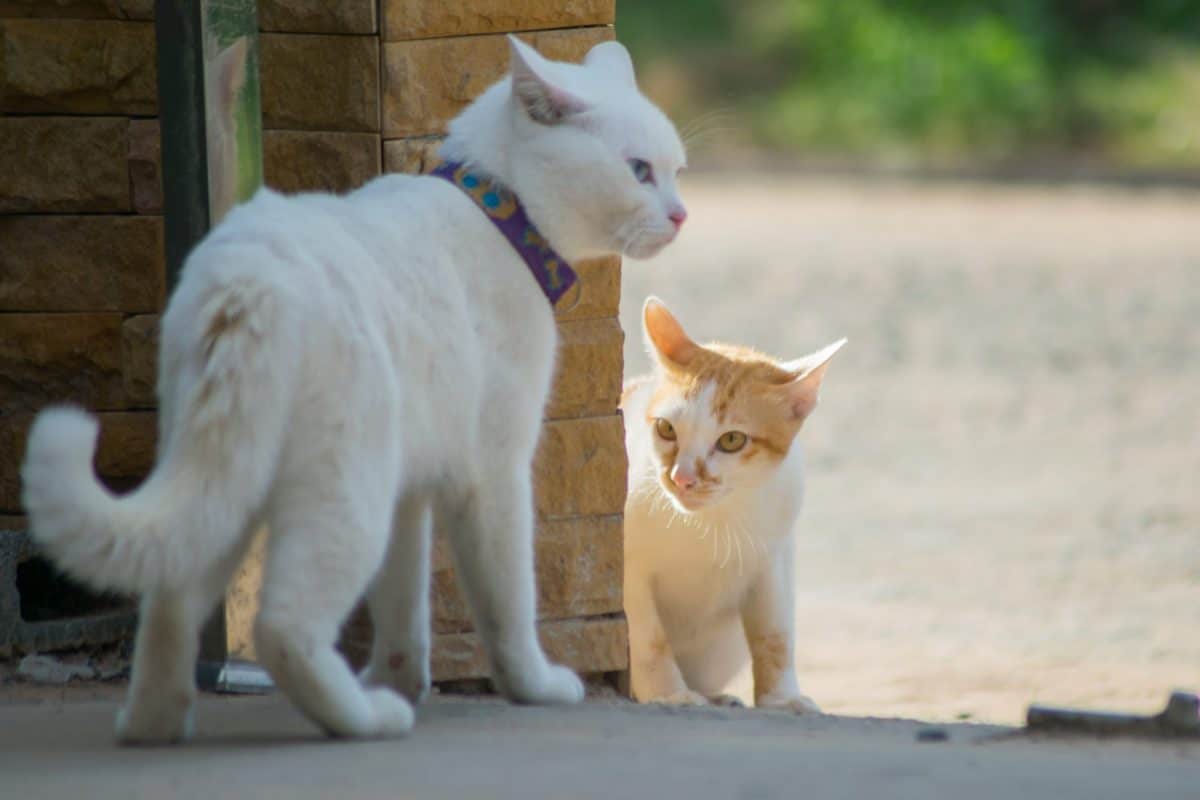




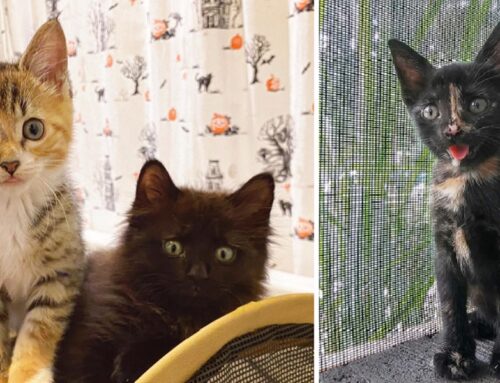
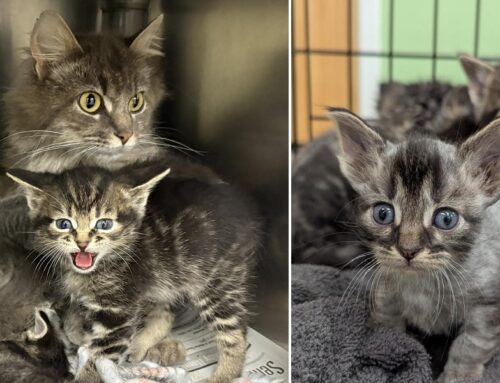


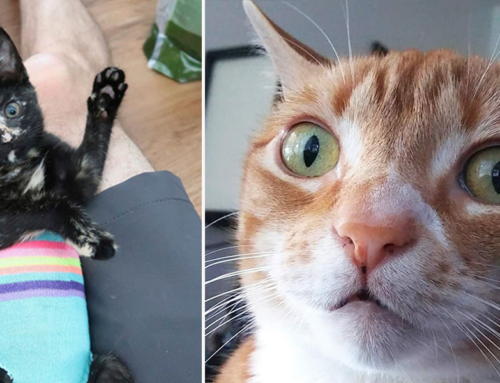
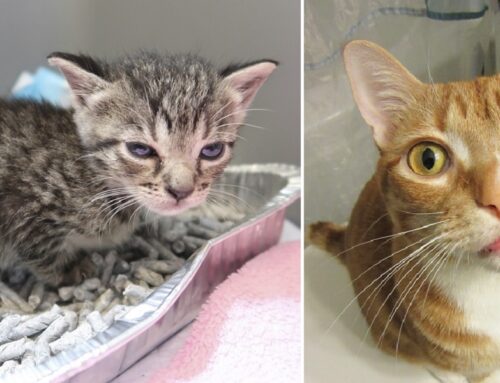



I have had a few cats over the years and most got on well in a multi cat household. There was the occasional scrap when one cat overstepped the mark with another and was quickly reprimanded. I did notice that the play fights were mostly silent, very little yowling or hissing was heard. Lots of ambushing, chasing and rolling about was involved but no noise. I had as much fun watching the wrestling match as did the cats.
My cat doesn’t like other cats.
As a kitten, she didn’t like playing with her siblings. She would watch them from a safe distance, usually from a cubby hole.
I have two 2.5 year old cats and a 2.5 year old dog (who thinks she’s a cat). They are often in a tussle around the house, sounds like someone trying to juggle bowling balls. Then minutes later they are in a cuddle puddle and sleeping. My 23 year old cat stays away from them and looks disapproving of their games.
Many years ago my mother-in-law had a Siamese cat that would not allow anyone but her to touch it. I love cats and I love Siamese cats, so i was frustrated to not be able to pet it. Finally I had an idea: when she started howling and spitting as I approached, I howled and spit right back, and I got to stroke her back 3 times before she noticed, and I quickly backed off. My m-in-law was in hysterics laughing at us!